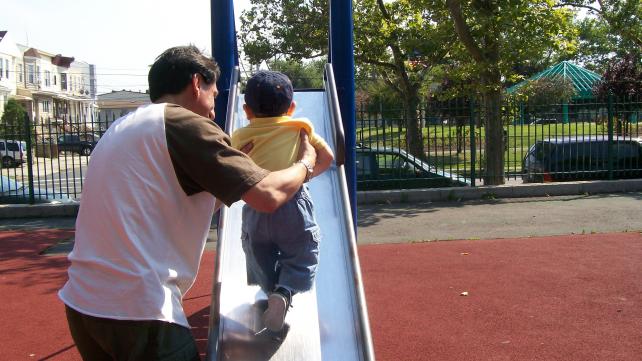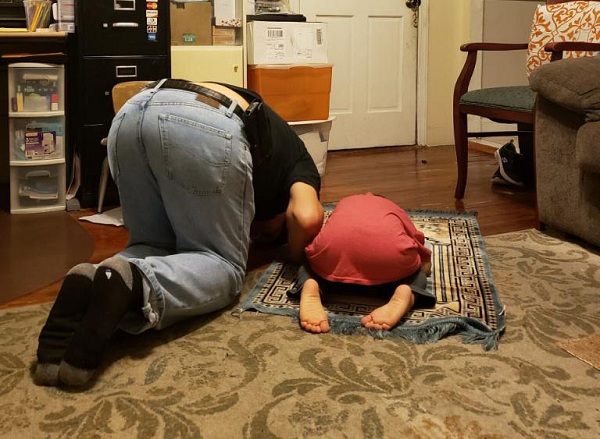
When my eldest son was just a toddler, he used to imitate his father and I when we prayed. When the time for salah came, he grabbed a small prayer mat he got as an Eid gift and laid it next to ours. He would lift his little hands up to the level of his ears and say, “Allaaaahu akbar!” Peeking at us from the corner of his eyes, he copied all the movements of the salah. Sometimes he would pretend to be the imam with an imaginary microphone made from a tower of building blocks! I have seen other Muslim children do the same, but it was so special to us since he was the first Muslim child born into our immediate families.
This was just one of the ways that the differences between Islam and Christianity manifested in our daily lives.
After moving in with my in-laws for a year, my son noticed that his abuelo, or grandfather, would not answer the call to prayer. He soon found out Abuelo was not Muslim. My husband’s mother embraced Islam about two years after her two only children converted, both young men in college at the time. Her husband, however, did not want to follow in their footsteps.
My father-in-law always had excellent manners with us and he respected our faith. He just wanted to continue the life he was used to. He grew up Catholic in Ecuador and he had a large family that enjoyed hosting parties that would sometimes involve religious and cultural traditions that are contrary to Islam. In fact, during the time we were living with them there were no other Muslims in our families other than us, my brother-in-law, and my mother-in-law. My own parents are Catholic although they do not go to church regularly, and my brother and his wife and children are Christian. They go to church and celebrate Christian holidays like Christmas and Easter. I knew that eventually I would have to explain to my son and my other children, who were being raised as Muslims, that their family did not share the same faith.
This task is easier said than done with young children who see their small world through the eyes of their parents. Their natural inclination is to worship the Creator alone and their Muslim mother and/or father model the example of the prophets, peace be upon them, in their worship. In a hadith, Abu Huraira reported that Prophet Muhammad, peace and blessings be upon him, said,
“No child is born but that he is upon the fitra (natural instinct). His parents make him a Jew, or a Christian, or Magian.”
(Bukhari and Muslim)
Allah created human beings with an innate leaning towards One God and the prophets prayed in the same manner that we, Muslims, pray today. When they are still toddlers and preschoolers, children do not yet understand the vast differences in cultures and religions. They may even think that other people outside their own community are strange.
This occurred with my son when he interacted more with his non-Muslim grandparents. He would ask them questions like why they wore a cross on their necklaces or why my mother did not cover her hair. He wondered why they did not line up to pray with us or why they ate while we were fasting. My mother would answer him by saying that her and my father were Christian. My son would just tilt his head and look at them bewildered, not quite understanding what that meant. On many occasions, he forced my father-in-law to pray with us. He used to find him and ask him to line up in salah. If he noticed that he was not bending down or prostrating, he would tug at his arm or push him down until his forehead touched the ground! Being the good sport that he was, his abuelo would simply comply and we would laugh about it later.
Explaining the Differences
I had many conversations with my son and my other children about why our relatives were not Muslim. I would gently explain that they held different beliefs about God than we did, but that we had to respect that. They were our family and we loved them no matter what. Islam teaches us to always uphold the ties of kinship. The only exception to this rule is if your parents or relatives persuade you to worship other gods besides Allah or to abandon your faith altogether. Allah explains this in the Quran,
“And We have enjoined upon man goodness to parents. But if they endeavor to make you associate with Me that of which you have no knowledge, do not obey them. To Me is your return, and I will inform you about what you used to do.”
(Surah Al-’Ankabut, 29:8)
The Quran is very clear about how we should treat our non-Muslim relatives, particularly our parents. Thankfully, there are many lessons that can be extracted to facilitate this conversation with our children. The example of Prophet Ibrahim (Abraham), peace be upon him, comes to mind when he tried to convince his father to stop worshiping idols. His father downright refused and when Ibrahim insisted, he even threatened him,
“How dare you reject my idols, O Abraham! If you do not desist, I will certainly stone you [to death]. So be gone from me for a long time!”
(Surah Maryam, 19:46)
Rather than become angry and argue with his father, Prophet Ibrahim remained calm. He responded,
“Peace be upon you! I will pray to my Lord for your forgiveness.”
(Surah Maryam, 19:47)
Sharing our Conversion Stories
I also told my son about how his father and I converted. It was important for him and my other children to know that their father and I were also Christians at one point, just like the rest of our family. We later just decided to convert to Islam after learning about the beauty of our monotheistic faith. It was also the case with our predecessors who lived with the Prophet, peace and blessings be upon him; they also embraced Islam and lived as the minority for a very long time. Having non-Muslim family members opens the way to dialogue and dawah. Children need to know that every human being is either a Muslim or a potential Muslim. No one is better than anyone else in front of Allah, except the one who has faith. Allah says in the Quran,
“O mankind, indeed, We have created you from male and female, and have made you into nations and tribes, that you may know one another. Indeed, the most honored of you in the sight of Allah is the most righteous. Indeed, Allah is Knowing and Acquainted.”
(Surah Al-Hujarat, 49:13)
It is necessary for children to be kind to non-Muslim relatives, understanding that we are all Allah’s creation. This lesson is one that will, insha’Allah, prevent them from going into dangerous extremes because arrogance and ignorance leads to intolerance. In a hadith, Asma bint Abu Bakr said,
“'My mother, who was an idolatress at the time, came to me during the Treaty of Peace that the Prophet, peace and blessings be upon him, conducted with the Quraysh. I came to the Prophet and said, 'O Messenger of Allah! My mother came visiting, desiring something from me, should I treat her with kindness?' The Prophet, peace and blessings be upon him, said, 'Yes. Keep a good relationship with your mother.'”
(Bukhari and Muslim)
This incident teaches us that some of the companions of the Prophet, peace and blessings be upon him, dealt with similar situations. He advised his followers to treat their relatives well, no matter their religion.

And Praying for Them
We should similarly teach our children to continuously pray for our non-Muslim relatives. Just as Allah guided us, He can bring our other family members into the fold of Islam. If they choose to continue their path, however, we should remain patient and compassionate. Even those relatives, friends, or neighbors who are not Muslims can become our allies when we show them good manners. While we may wish that they embrace Islam, we leave it up to Allah’s perfect plan. Remember that even the prophets were unable to guide everyone. Allah says in the Quran,
“Indeed, [O Muḥammad], you do not guide whom you like, but Allah guides whom He wills. And He is most knowing of the [rightly] guided.”
(Surah Al-Qasas, 28:56)
More than a decade later, my father-in-law is the one who reminds us to pray. He embraced Islam in 2012. We still reminisce about how my son used to push his head to the ground in sujud or prostration. Now he does it willingly. Allahu akbar!
As for my parents, and other non-Muslim relatives, they were able to look past all the awkward, candid questions and comments from their grandchildren. They still insist on giving them gifts for Christmas, but they also give them gifts for Eid – double the fun for the kids so they do not complain! Now that my children are older, they appreciate that our family is diverse. I honestly feel that kids who come from these types of blended religious family dynamics are better equipped to navigate the real world. That is when they will more than likely be on the receiving end of the tough questions and, hopefully, inshaAllah, by Allah’s will, they will be prepared because of these memorable experiences with their relatives.
Wendy Díaz is a Puerto Rican Muslim writer, award-winning poet, translator, and mother of six. She is the co-founder of Hablamos Islam, Inc., a non-profit organization that produces educational resources about Islam and culture in Spanish. She is also the Spanish content coordinator for the Islamic Circle of North America’s WhyIslam Project and has also written, illustrated, and published a dozen children’s books. Díaz lives with her husband and family in Maryland. The photos included in this article are of her son Uthman and his abuelo.



Add new comment